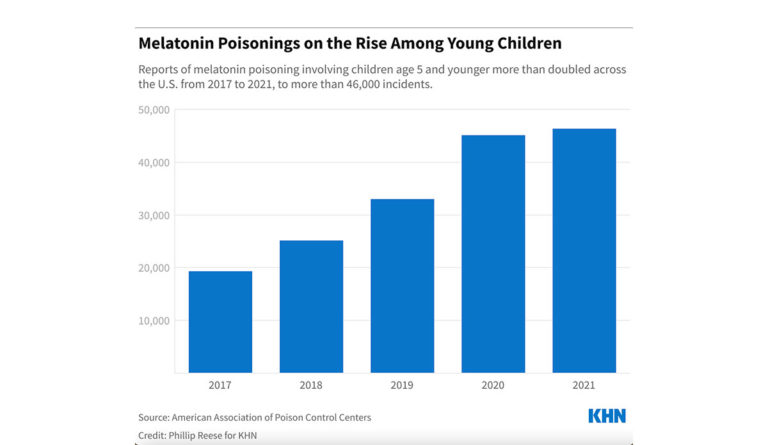Melatonin Miracle?
Rates of melatonin poisoning among children age five and under more than doubled from 2017 to 2021 in the U.S.

Read Time: 2 minutes
Published:
Getting a child to sleep may be one of the biggest challenges of parenthood. Society has progressed from rubbing whiskey or laudanum on a child’s gums, but there is still a booming market for sleep aids to help an exhausted household.
Melatonin supplements have become the answer to many parents’ dreams. Sales soared from $285 million in 2016 to $821 million in 2020. But recent reports of exponential increases in melatonin poisonings among young children take the miracle out of melatonin, a hormone marketed as a natural and safe sleep supplement for adults that children seem to be ingesting as well.
Dr. Karima Lelak and team reported a 530% increase in pediatric melatonin poisonings between 2012-2021. Overdose symptoms can include dizziness, headaches, and nausea, and in rare cases, respiratory problems and death; 94.3% of reported ingestions were accidental.
Rates of melatonin poisoning among children age 5 and under more than doubled from 2017 to 2021 in the U.S. The largest increase in melatonin-related hospitalizations was also in this age group. During COVID-19 lockdown, children have been more likely to come across the popular supplement in their homes as parents struggle with insomnia.
In the U.S., the Food and Drug Administration classifies melatonin as a dietary supplement, meaning there are few regulations. An American Academy of Sleep Medicine study from 2017 found melatonin dose amounts were inconsistent from what was advertised on the label, increasing the risk of the sleep-deprived using more than intended.
Little is known about the effects of long-term melatonin use and even less is known about how extra amounts of the hormone can affect child development. These uncertainties, along with inconsistent dose amounts in unregulated supplements, caused the United Kingdom, Canada, Japan, the European Union, and Australia to ban over-the-counter melatonin and make it only available by prescription.
The rise in pediatric melatonin poisonings suggests the U.S. might now consider treating melatonin as a potentially dangerous medication. While melatonin is a far better option than feeding a child alcohol or opium, the natural supplement still introduces risks for children in the house.
Databyte via Jenny Gold, Philip Reese. Can Melatonin Gummies Solve Family Bedtime Struggles? Experts Advise Caution. Kaiser Health News, March 24, 2022.



